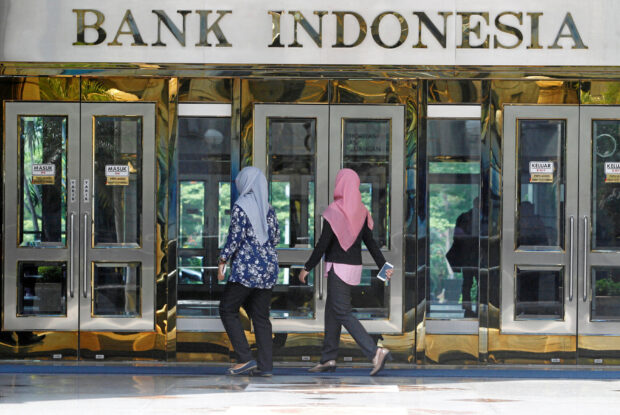
People walk to an entrance at Indonesia’s central bank Bank Indonesia in Jakarta, Indonesia July 21, 2016. REUTERS/Iqro Rinaldi/File photo
JAKARTA – Bank Indonesia could maintain price stability with past rate hikes, a deputy governor said on Wednesday, signaling policy rates will be held steady again later this month as authorities try to shore up confidence in currency and bond markets.
The comments by Bank Indonesia (BI)’s Destry Damayanti, the second most senior official at the central bank and a member of its rate-setting board, came as the bank bought government bonds in an effort to stem a selloff in the debt market and rupiah currency.
It was the first bond-buying operation by the BI since 2022, underscoring anxiety in official circles about the shakeout in markets, with the rupiah extending its fall on Wednesday to as low as 15,640 a dollar, its weakest since Dec. 30.
The benchmark 10-year bond yield also hit 7.067 percent, the highest since November, before falling slightly.
READ: Indonesia central bank stands pat on rates for 8th monthly review
“We have raised (rates) by 225 basis points. And this figure, 225 bps, we view as enough to maintain stability right now, stability in inflation, and on the other hand enough to spur lending growth,” Destry told a seminar, referring to rate hikes between August to January.
Destry said the current market volatility was due to external factors, particularly hawkish comments by U.S. Federal Reserve officials, adding that “everything is okay” with Indonesia’s economy.
BI is due to hold a two-day monetary policy meeting on Oct. 18 to 19, with most analysts expecting the bank to hold rates steady at 5.75 percent for the ninth straight month given inflation has eased to near the bottom of the central bank’s target range.
However, rate cuts are not yet on the central bank’s radar, analysts say, noting that officials are likely to take a cautious approach to any future monetary easing because of the weakening rupiah.
READ: Indonesia central bank intervenes to defend rupiah, open to buying bonds
BI on Tuesday intervened in the foreign exchange market to manage the supply and demand of U.S. dollar, another official said.
Growth in Southeast Asia’s largest economy could reach around 5 percent this year, or the midpoint of BI’s 4.7 percent to 5.3 percent official GDP growth outlook, Destry said, compared with last year’s 5.3 percent GDP expansion.


